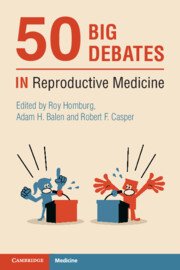Book contents
- 50 Big Debates in Reproductive Medicine
- Series page
- 50 Big Debates in Reproductive Medicine
- Copyright page
- Contents
- Contributors
- Foreword
- Introduction
- Section I Limits for IVF
- Section II IVF Add-ons
- Section III The Best Policy
- Section IV Embryology
- Section V Ethics and Statistics
- 30A Sex Selection Should Be Permitted for Family Balancing
- 30B Sex Selection Should Be Permitted for Family Balancing
- 31A Reproductive Medicine Should Be Publicly Funded
- 31B Reproductive Medicine Should Be Publicly Funded
- 32A Gamete Donation Should Be Anonymous
- 32B Gamete Donation Should Be Anonymous
- 33A Uterus Transplantation Is a Step Too Far
- 33B Uterus Transplantation Is a Step Too Far
- 34A Meta-analysis Should Not Be Considered Class A Evidence
- 34B Meta-analysis Should Not Be Considered Class A Evidence
- Section VI Male-factor Infertility
- Section VII Genetics
- Section VIII Ovarian Stimulation
- Section IX Hormones and the Environment
- Index
30B - Sex Selection Should Be Permitted for Family Balancing
Against
from Section V - Ethics and Statistics
Published online by Cambridge University Press: 25 November 2021
- 50 Big Debates in Reproductive Medicine
- Series page
- 50 Big Debates in Reproductive Medicine
- Copyright page
- Contents
- Contributors
- Foreword
- Introduction
- Section I Limits for IVF
- Section II IVF Add-ons
- Section III The Best Policy
- Section IV Embryology
- Section V Ethics and Statistics
- 30A Sex Selection Should Be Permitted for Family Balancing
- 30B Sex Selection Should Be Permitted for Family Balancing
- 31A Reproductive Medicine Should Be Publicly Funded
- 31B Reproductive Medicine Should Be Publicly Funded
- 32A Gamete Donation Should Be Anonymous
- 32B Gamete Donation Should Be Anonymous
- 33A Uterus Transplantation Is a Step Too Far
- 33B Uterus Transplantation Is a Step Too Far
- 34A Meta-analysis Should Not Be Considered Class A Evidence
- 34B Meta-analysis Should Not Be Considered Class A Evidence
- Section VI Male-factor Infertility
- Section VII Genetics
- Section VIII Ovarian Stimulation
- Section IX Hormones and the Environment
- Index
Summary
Here are four arguments against sex selection: 1. It encourages ‘parenting by stereotype’, where the desire to have a child of a certain gender may be based on a stereotypical ideal of what that gender is supposed to be like. 2. It is typically done in favour of males, leading to a significant shortage of females, which causes a myriad of serious problems. 3. It gives Preimplantation Genetic Diagnosis (PGD) a bad name. PGD is utilised to screen out a panoply of genetic disorders such as Lou Gehrig's Disease, breast cancer, and cystic fibrosis. Using it to screen out an unwanted gender is a poor way to deploy scarce medical resources and know-how. 4. It could be a gateway to eugenics, the widely condemned theory of improving humanity by preventing inferior people from reproducing while encouraging reproduction of those judged to be superior.
- Type
- Chapter
- Information
- 50 Big Debates in Reproductive Medicine , pp. 158 - 159Publisher: Cambridge University PressPrint publication year: 2021

